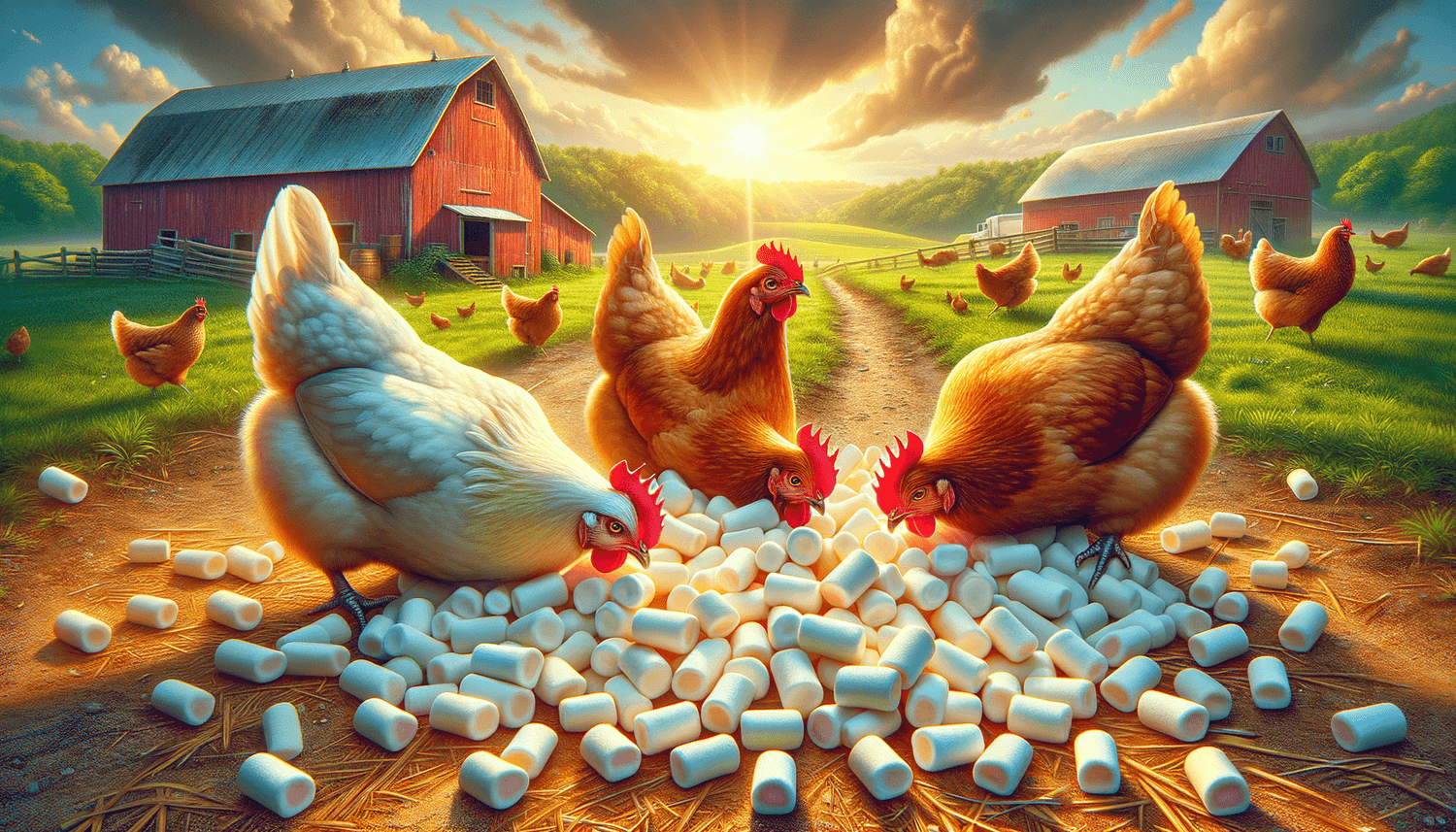Cluck, cluck, gather around, backyard chicken enthusiasts! Are you wondering if your fluffy, feathered friends can join you in your sweet tooth indulgences? Well, let’s have a fun peck at the topic: “Can Chickens Eat Marshmallows?” In this exciting blog post, we will be exploring whether these squishy, sugary treats pass the chicken taste test, discussing the importance of maintaining a balanced diet for your beloved chicks, an overview of any benefits or risks associated with marshmallow consumption, the nutritional value (or lack thereof), and how to best prepare these soft, white clouds of sweetness for your coop. So ruffle your feathers and let’s dive into the world of chicken treats!
Can chickens eat marshmallows?
Chickens can eat marshmallows, but it is not recommended as a regular treat. While it is generally safe for chickens to consume marshmallows in small quantities, these sugary treats offer no nutritional value and could potentially lead to health issues if consumed in excess. It’s always best to maintain a balanced diet for your backyard chickens and provide treats that offer beneficial nutrients.
A balanced diet for happy, healthy chickens
Just like humans, chickens require a balanced diet to remain in tip-top shape and maintain their overall health. A key component of keeping your chickens strong and content is providing them with the right mix of nutrients. This is where high-quality chicken feed comes into play! Chicken feed should make up approximately 80-90% of your feathered friends’ diet, ensuring they receive the essential vitamins, minerals, and proteins needed for optimal growth and egg production.
As for treats, variety is the spice of life, and your chickens will certainly appreciate it. The remaining 10-20% of a chicken’s diet can consist of tasty and nutritious extras like fruits and vegetables. Remember, moderation is key when introducing new treats to your chickens, as you want to maintain the balance of nutrients they receive from the chicken feed. By providing a diverse range of wholesome munchies, you’ll not only enrich your backyard flock’s lives but also contribute to their overall health and happiness.
Nutritional value of marshmallows for chickens.
When it comes to feeding marshmallows to chickens, it’s important to consider the nutritional value of these sugary treats. Marshmallows are primarily composed of sugar, water, and gelatin, which means they don’t offer much in terms of vitamins, minerals, or other nutrients that are essential for maintaining your flock’s well-being. While they might be tempting as a quirky snack, marshmallows do not contribute positively to a chicken’s health.
In fact, the high sugar content of marshmallows can actually pose a risk to your chickens if consumed in large quantities. Excess sugar in a chicken’s diet can lead to obesity, which in turn can bring about other health issues such as fatty liver disease or reduced egg production. It’s crucial to remember that while chickens can eat marshmallows, there is no real nutritional benefit to be gained, and overconsumption could result in negative health impacts. As responsible backyard chicken-keepers, it’s essential to prioritize the well-being of your flock by providing them with nutritious and healthful treat options.
Nutrition table of marshmallows for chickens.
| Information | Description |
|---|---|
| Nutritional Value | Marshmallows have little to no nutritional value for chickens, as they primarily consist of sugar, water, and gelatin. |
| Suggested Serving Size | Small amounts only; avoid feeding marshmallows as a regular treat. |
| Safe Feeding Practices | Offer marshmallows sparingly and in moderation, prioritizing more nutritious treats such as fruits and vegetables. |
| Preparation | Cut marshmallows into small, manageable pieces for easier consumption by chickens. |
| Potential Risks | Excess sugar can lead to obesity and related health issues such as fatty liver disease or reduced egg production. |
| Hydration | No significant impact on chicken’s hydration, as water content is minimal. |
| Digestion | Digestion should not be significantly affected by small amounts of marshmallows, but large quantities may cause discomfort or other digestive issues. |
| Seasonal Availability | Marshmallows are available year-round. |
| Other Benefits | Although marshmallows do not offer nutritional benefits to chickens, they could be viewed as a novelty treat that adds variety to their diet, but only in limited quantities. |
Alternative treat options for chickens
If you’re looking for more nutritious treat options for your backyard chickens, consider offering them fruits and vegetables that are packed with vitamins and minerals. Some popular and healthy choices include leafy greens like kale and spinach, as well as fruits such as blueberries and cantaloupe. These nutrient-rich snacks will contribute positively to your chickens’ overall health and wellbeing.
Safe food handling for chickens
When preparing treats for your chickens, it’s essential to practice safe food handling techniques to minimize the risk of foodborne illness. Wash all fruits and vegetables thoroughly before offering them to your flock, and remove any spoiled or rotten portions. Cut large treats into smaller, manageable pieces to reduce the risk of choking. And always keep an eye on your chickens while they enjoy their treats to ensure everyone is eating safely and experiencing no adverse reactions.
Monitoring your chickens’ health
Regularly observing your chickens and noting any changes in their behavior, appearance, or egg production can help you quickly identify and address any health concerns. If you’re ever unsure about the safety of a particular treat, consult with a veterinarian or poultry expert to determine the best course of action. Remember, a well-balanced diet remains the key to optimal health for your backyard chickens, and offering treats in moderation keeps their menu varied and satisfying.

















